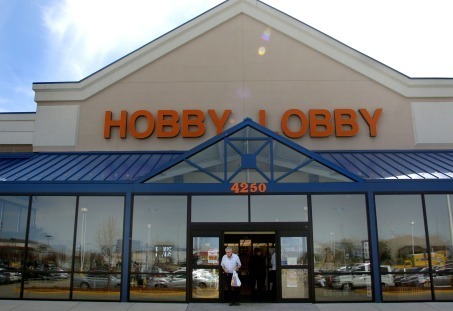Hobby Lobby, the big-box craft store chain, recently lost the first round of its case against the administration over President Obama’s contraception mandate. The national chain will be fined $1.3 million per day starting January 1st if it does not pay for contraception, sterilization, and abortifacients through employer-provided insurance.
The argument the administration advanced successfully in the Hobby Lobby case is a particularly troublesome one for believers of all faiths who operate under the assumption they can use their moral principles to guide the way their place of business spends money.
According to the administration’s legal arguments, the family that owns Hobby Lobby is not protected by the First Amendment’s “free exercise” clause because “Hobby Lobby is a for-profit, secular employer, and a secular entity by definition does not exercise religion.”
Federal Judge Joe Heaton agreed, finding Hobby Lobby is a “secular” corporation and thus has no right to use the religious beliefs of their ownership as a justification for not abiding by a government mandate. Another judge recently ruled Bible publisher Tyndale House is not a secular company—so apparently being a Bible publisher does make you religious, but being a Bible seller doesn’t.
Shifting Costs to Taxpayers
Secular or not, the Hobby Lobby folks are a straight-up American success story. A family business, started in Oklahoma in 1970 with a $600 bank loan, they started by making their frames from wood bought from local sellers, building them in their garage. The kids glued them together on the kitchen table in exchange for baseball cards.
The family opened their first retail frame shop in Oklahoma City in 1972. They had four employees. Now they have 514 stores in 41 states, employing 13,240 people full time. In 1981 they added another store to the family, Mardel, a Christian/church supply shop which sells Bibles and study books, curriculum, Christian craft supplies. That’s another 35 stores, in seven states, with 372 employees.
Overall, the organizations grew from a garage business started with $600 to two businesses that employ more than 13,600 people full-time, across the nation.
The company has remained privately owned, with no franchising. Its statement of purpose and various commitments all begin with Bible verses, commitments to honor the Lord. Hobby Lobby pays well above the minimum wage and has increased salaries four years in a row despite the recession.
The family are teetotalers, refusing to stock shot glasses, and they don’t allow backhauling of beer shipments by their truckers. Every Christmas and Easter, the Hobby Lobby owners advertise a free Bible and spiritual counseling. The stores are closed every Sunday. The family also signed the “Giving Pledge,” committing to donate the majority of their wealth to philanthropy.
Do Corporations Have Rights?
If Hobby Lobby loses this case, it’s not hard to see what decision they’ll make given the choice between a $1.3 million per day fine and a fine of $2 million per month. The latter is the amount they estimate they’ll pay for simply dropping insurance altogether and shifting all employees onto Medicaid and the subsidized exchange coverage.
Should Hobby Lobby lose, it can just drop coverage and pay employees the difference, shifting them onto the taxpayer dime rather than compromising their beliefs. It will save the company tens of millions of dollrs in the long run, but it will cost the taxpayers.
The case isn’t over. There will be an appeal, and the case could end up at the Supreme Court. There’s also a bipartisan effort underway in Congress to expand the religious exemption to Obama’s mandate, though that is targeted more at individuals than companies.
It may be that the next major court decision regarding Obamacare will deal with how religious freedom rights apply to corporations. A Hobby Lobby case which follows with, or breaks from, the lessons of Citizens United could have enormous ramifications for religious business owners across the country.
Americans will find out soon whether freedom of association matters or, instead, life under the Obama health insurance regime means you must sacrifice your most sacred beliefs the instant you start a business.





